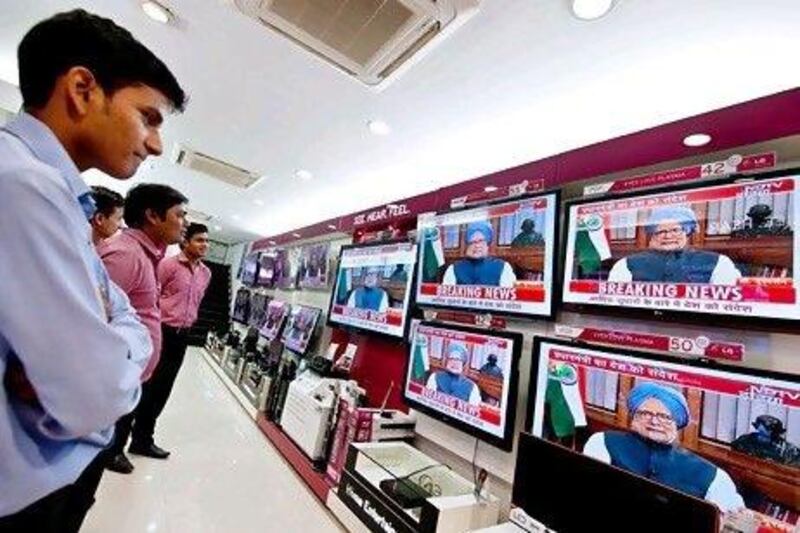NEW DELHI // Malini Sharma settled in front of her television on Friday to watch a rare broadcast by the Indian prime minister, as he addressed the nation.
By the time Manmohan Singh began defending his Congress party-led coalition government's reforms - including an increase in the price of fuel for cooking and driving and the opening up of India to foreign retail stores - Mrs Sharma was no longer interested.
Instead, she returned to the kitchen to prepare her children's lunches for the next day.
"I thought, with all these protests on the streets against foreign brands, let's see what the big deal is all about," said Mrs Sharma, 34, who works as a secretary at clothing firm in New Delhi. "I respected what he said but I would have liked to hear more about how this was going to affect our daily life."
Millions of retailers, workers and supporters of political parties that oppose the government's economic decisions took to streets in protest against them across the country on Thursday. A few hours before Mr Singh's televised address, the Trinamool Congress, a key ally of the Congress party, withdrew its support for the government in protest.
Mamata Banerjee, the leader of the Trinamool Congress, called the reforms "anti-people", saying that they would hurt the middle class and the poor.
All Mrs Sharma wanted to know was whether the government would reconsider the recently announced five-rupee (30 fils) increase in the price of diesel.
"This will strain our budget," she said. "We will adjust how much we drive."
Mr Singh, in a rare gesture of openness, explained in detail how his government had decided limit to six the number of subsidised cooking gas canisters each family are entitled to each year.
"Almost half of our people, who need our help the most, actually use only six cylinders or less," said Mr Singh. "We have ensured they are not affected."
But Mrs Sharma worried about the limit. "How I am supposed to manage if I run out of [cooking] gas?" she asked. "We may be forced to buy it on the black market," she added, referring to a common practice of homes supplementing a shortage by buying it from brokers who sell stolen canisters of government-subsidised fuel at twice the price.
During his 15-minute speech, delivered in two languages, Hindi and English, Mr Singh referred four times to the financial crisis in 1991, which forced India to embrace sweeping economic reforms.
"The last time we faced this problem was in 1991," he said. "I know what happened in 1991 and I would be failing in my duty as prime minister of this great country if I did not take strong preventive action.
"In 1991, when we opened India to foreign investment in manufacturing, many were worried.
"Please do not be misled by those who want to confuse you by spreading fear and false information. The same tactics were adopted in 1991. They did not succeed then. They will not succeed now," added Mr Singh, who was the country's finance minister in 1991.
Dr JK Chaudhry, 89, a retired surgeon who volunteers at hospitals at his local Gurudwara, a place of worship for Sikhs, remembers those reforms.
"I remember 1991 very well," said Dr Chaudhry, whose patients at the Gurudwara include lorry drivers and chauffeurs. "It didn't mean much for the daily worker even then, although it meant a lot for the economy."
He watched Friday's speech on television but said the people who the prime minister intended to reach did not get the message.
"They don't know much about the economy, they only know everyday expenses," he said. "They only look at what they can save and send back home. They understand inflation but not long-term forecasts of the economy."
Hindol Sengupta, the author of The Liberals, a book about India's liberalisation and the middle class, said that Mr Singh's use of phrases such as "money does not grow on trees" and "do not be misled", left him feeling like he was being lectured by a parent.
"These are classic parent statements in India to a teenager," said Mr Sengupta. "And that is why the middle class likes him. He comes across as a benevolent, honoured man who will take care of them.
"They never had a problem with him taking tough economic decisions, that what he has done now is perhaps good for them."
But Mr Singh's paternalistic presentation and appeal among the middle classes may not be enough.
His speech did not address a glaring blot on his premiership - the myriad corruption scandals plaguing his government, including recent allegations of corruption in the allocation of coal-mining concessions that were given out without auction to about 100 companies between 2004 and 2009. Mr Singh was in charge of the coal portfolio when the alleged scam took place.
"He was always seen as above corruption but Mr Singh failed to address the kind of corruption that has gone on under his watch," said Mr Sengupta. The voters won't let him get away with that anymore.
"After these political scandals, people are not going to trust him anymore. His speech was basically saying, 'We, the government are in trouble and we need your support.'"





